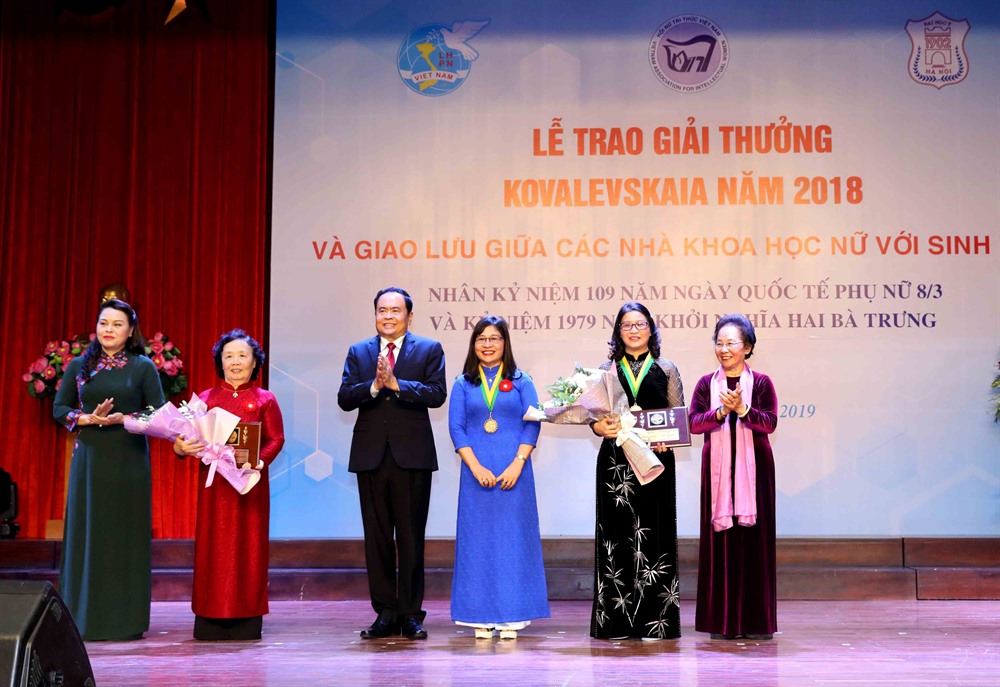 |
| Professor Nguyễn Thị Lan, director of Việt Nam University of Agriculture (second from right), and lecturers from the Environmental Technology sub-department under the Environment Department of Hà Nội University of Science – Việt Nam National University (second from left) receive the Kovalevskaya Award - an international prize for the most outstanding female scientists. — VNA/VNS Photo Phương Hoa |
Viet Nam News HÀ NỘI — Professor Nguyễn Thị Lan, director of Việt Nam University of Agriculture, yesterday received the Kovalevskaya Award – an annual honour presented to outstanding female scientists who have gained remarkable achievements in the research and application of science.
Lan, born in 1974, started her career as a veterinarian. Now, she is a senior professor of animal diseases at the university.
She has had 105 articles published in local and international scientific journals. Many of her works have been widely recognised such as her contribution to the vaccine against fever in dogs and quick test kits to detect the Porcine Reproductive and Respiratory Syndrome virus (PRRS) – a virus that causes a disease in pigs, also known as blue-ear pig disease.
She is also a supervisor for PhD and masters students and has worked to compile textbooks and programmes and update teaching methods.
Speaking at a press briefing on the Kovalevskaya award last Friday, Lan said she had a real passion for studying vaccines for pets.
As director of the agriculture university, Lan said she paid attention to developing human resource for agriculture, rural areas and farmers.
“High quality human resources are a prerequisite to developing a modern agriculture and civilised rural areas,” she said.
“Nowadays, university graduates need not only good knowledge and expertise, but also skills – especially in creation, teamwork and critical thinking – so they cannot be replaced by robots and artificial intelligence,” she said.
The Kovalevskaya Award’s group category was given to female lecturers of the Environmental Technology sub-department under the Environment Department of Hà Nội University of Science – Việt Nam National University for their research on waste treatment technology and environment quality analysis.
The sub-department has a staff of 13, nine of whom are women.
Over the last ten years, the nine female researchers conducted 33 study projects and joined 65 others at universities and international co-operation projects.
They also contributed to develop 24 textbooks used locally, three textbooks used overseas. They had 30 articles publicised on international scientific journals and other 114 articles on local journals.
Associate Professor Dr Nguyễn Thị Hà, head of the Environment Technology Sub-Department, said that a major challenge for environment technology researchers is to balance economic and environmental factors.
A member of the sub-department, Dr Trần Thị Huyền Nga, said that during study projects, they spent almost all of their time at labs working in silence.
“Sometimes we feel very nervous and exhausted,” Nga said. “Persistence and sacrifice are two advantages of women that play an important role in our success.”
Former State President Nguyễn Thị Doan, chairwoman of the National Committee for the Kovalevskaya Award, said at the ceremony yesterday that female scientists’ successes made them famous but, more importantly, they also helped increase social productivity, create more jobs and provide better human resources, contributing to national development.
President of the Việt Nam Fatherland Front (VFF) Central Committee Trần Thanh Mẫn said that gender prejudice on the role of women in the family was a barrier for female scientists, forcing them to spare no efforts if they wanted to spend as much time as men did on scientific pursuits.
Mẫn said besides the women’s efforts, people should have proper understanding and recognition of their roles and contributions.
He said Việt Nam would continue to have policies to help Vietnamese women in general and female scientists in particular promote their talents and abilities.
The Kovalevskaya Award is named after Russian mathematician Sofia Kovalevskaya, and is awarded by the fund of the same name. The fund operates in eight countries in Latin America, Africa and Asia.
The award was first given to Vietnamese scientists in 1985. Since then, 48 individuals and 19 groups of outstanding Vietnamese women in science have received the award. — VNS
.jpg) Society
Society
.jpg)

.jpg)



